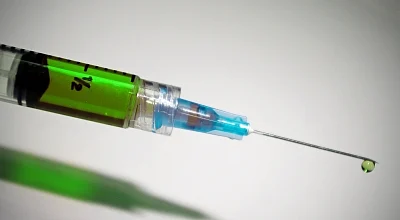Drug companies around the world have been backed by Germany and other nations in their opposition to a waiver of rules protecting the intellectual property behind COVID-19 vaccines.
The United States, on the other hand, has backed this waiver, which sent the shares of American and European vaccine-makers tumbling on Wednesday, 5 May.
It is now up to the World Trade Organisation (WTO) to find common ground for wider distribution of COVID-19 vaccines in poorer countries.
The Issue
At the heart of this issue is a 1995 WTO agreement on trade-related aspects of intellectual property rights, known as TRIPS (Trade-Related Aspects of Intellectual Property Rights). It provides enforceable rules for safeguarding trademarks, designs, inventions and other intangible goods in global trade, reported Bloomberg.
The agreement has once again come to the forefront in the context of stemming the COVID-19 surge in developing countries.
India and South Africa have proposed a broad waiver from the TRIPS rules on the production and export of vaccines and other critical medical goods needed to combat the coronavirus.
The WTO's 'Third Way'
WTO's new director-general, Ngozi Okonjo-Iweala, who officially began her tenure in Geneva just over two months ago, has proposed an alternate way to solve this crisis.
Okonjo-Iweala has proposed that private companies engage in licencing agreements with nations to share some, but not all of the knowledge and designs needed to produce vaccines in the developing world, reported Bloomberg.
This will pay heed to the requests of poorer countries who say that given their lack of capital and other resources, they should be allowed to do all they can to save their citizens without the fear of punitive action being taken against them.
Proponents of the waiver, like humanitarian organization Médecins Sans Frontières, argued that it was morally wrong for wealthy nations to hoard vaccine know-how and for pharmaceutical companies to prioritize profits over lives in poor nations.
Complications in IP Waiver
Opponents of the waiver argue that intellectual property (IP) rules incentivize companies to take the risks that are involved in development and deployment of multiple COVID-19 vaccines in less than a year.
A spokesperson of the German government said on Thursday, 6 May, that the waiver would create "severe complications" for the production of vaccines.
"The limiting factor for the production of vaccines are manufacturing capacities and high-quality standards, not the patents," she said, adding, "The protection of IP is a source of innovation and this has to remain so in the future."
There are, however, likely to be more negotiations on this, given the differing views within the European Union (EU) said WTO spokesperson Keith Rockwell.
"It's such an important issue that there needs to be some form of movement," he told reporters." "Let's see if the EU comes forward with some other kind of idea. We'll have to wait and see how that goes."
Biden's Support for Waiver
The US expects that negotiations regarding the waiver will take a while, White House spokeswoman Karine Jean-Pierre told reporters on Air Force One on Thursday, 6 May.
"It's not going to happen tomorrow or the next day. It will take a few months before this happens and we will continue to have the conversation and also just continue the negotiations," she said.
Meanwhile, the US is working on increasing the manufacturing capacity for and production of raw materials, shortages of which have hampered vaccine output and spurred accusations that the US was hoarding precious supplies.
A European participant in the IP protection debate on Thursday indicated that a middle ground was achievable at the WTO, said Bloomberg.
"It is very positive that the United States is now indicating that it will commit itself to finding a solution that is less far-reaching than the proposal that was originally on the table and on which there was great disagreement," Norway's foreign ministry said in a statement. "This could be a limited and targeted measure to avoid patents being a possible bottleneck."
(Curated from Bloomberg)
(At The Quint, we question everything. Play an active role in shaping our journalism by becoming a member today.)
